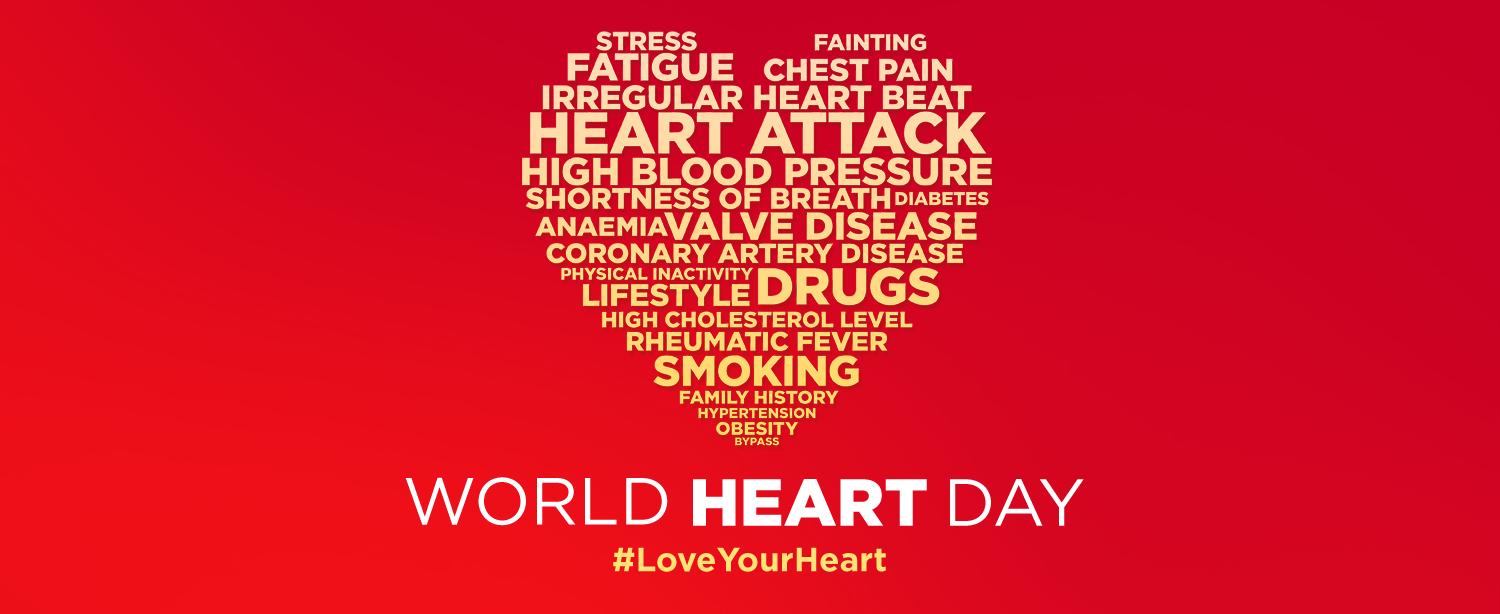How important is your heart?
Your heart is the most crucial organ in the functioning of the entire human body. Your heart is the centre of your cardiovascular system. It is responsible for just about everything that your body does — ranging from the transportation of oxygen, supply of nutrients to maintaining a good immune system. Your heart is a pump, composed of muscle which pumps blood throughout the body, beating approximately 72 times per minute of our lives.
Heart disease describes a range of conditions that affect your heart. The term “heart disease” is often used interchangeably with the term “cardiovascular disease”.
Some of the most common types of heart diseases are highlighted below:
- Coronary artery disease is the most common type of heart disease. The arteries carrying blood to the heart muscle are lined with plaque, which contains materials such as cholesterol and fat. This plaque build-up causes the arteries to narrow, allowing less oxygen to reach the heart muscle than required. This lack of oxygen to the heart leads to chest pain (angina) or heart attack.
- Heart failure occurs when the heart is not able to pump sufficient oxygen-rich blood to meet the needs of the rest of the body. This may be due to lack of force of the heart to pump or as a result of the heart not being able to fill with enough blood or both.
- Heart valve disease occurs when one or more of the four valves in the heart do not function properly. Heart valves help to ensure that the blood being pumped through the heart keeps flowing forward.
- Arrhythmia is when the patient suffers irregular or abnormal heartbeat.
- Congenital heart disease is a birth defect, where there is a problem with the heart structure. This defect can be simple or complex, some defects may require immediate correction by surgery while some defects may also cause varying degrees of disability.
- Rheumatic Heart disease begins with a bacterial infection in childhood affecting joints and heart valves. The heart disorder appears many years later and may need surgical intervention.
- Heart muscle disease or Cardiomyopathy causes the heart to become enlarged or the walls of the heart to become thick. This causes the heart to be less able to pump blood throughout the body and often results in heart failure.
Hereditary factors, our diet and our fitness levels can severely affect the overall health of your heart and the many other tissues that make up your cardiovascular system
Know the risk factors of getting a heart disease:
- Family History
- Smoking
- High blood pressure
- High blood cholesterol
- Diabetes
- Unhealthy diet
- Sedentary lifestyle
- Obesity
- Stress
- Poor hygiene
You might know that eating certain foods can increase your heart disease risk, however food habits are tough to change. Same is the case with fitness and lifestyle.
Listing down some heart healthy tips:
1. Control your portion size
Control your portion sizes, use small plates, avoid overloading your plate and eating till you are stuffed.
2. Eat more vegetables and fruits
Eat five servings of fruits and vegetables daily to boost your heart health. Vegetables and fruits are good sources of vitamins and minerals and are also low in calories and rich in dietary fibre.
3. Select whole grains
Whole grains are good sources of fibre and other nutrients that play a role in regulating blood pressure and heart health. You can increase the amount of whole grains in a heart-healthy diet by making simple substitutions for refined grain products.
4. Limit unhealthy fats
Limiting how much saturated and trans fats you eat is an important step to reduce your blood cholesterol and lower your risk of coronary artery disease. A high blood cholesterol level can lead to build-up of plaques in your arteries, risking your heart health.
5. Choose low-fat protein sources
Legumes — beans, peas and lentils — also are good sources of protein and contain less fat and no cholesterol, making them good choices.
6. Reduce the sodium in your food
Eating a lot of sodium can contribute to high blood pressure, a risk factor for cardiovascular disease. Healthy adults must have no more than 2,300 milligrams (mg) of sodium a day (about a teaspoon of salt)
7. Exercise
Include 10 minutes of moderately intense physical activity in your daily routine. Try to slowly increase your physical activity to 30 minutes, even simple workouts help eg. take the stairs, take a walk, get moving.
9. Get enough sleep
Quality sleep is good for your heart. Sound sleep of 8 hours is important for your body to recover.
Take great care of your heart health. For any heart related discomfort or complain contact us immediately. Call our emergency helpline 022-30919191 or visit our Cardiac centre for expert advice. Please find below link for further details:
https://www.kokilabenhospital.com/departments/centresofexcellence/centrefor_cardiacsciences.html


